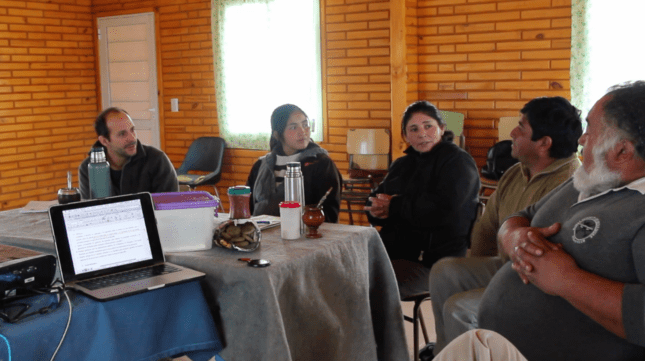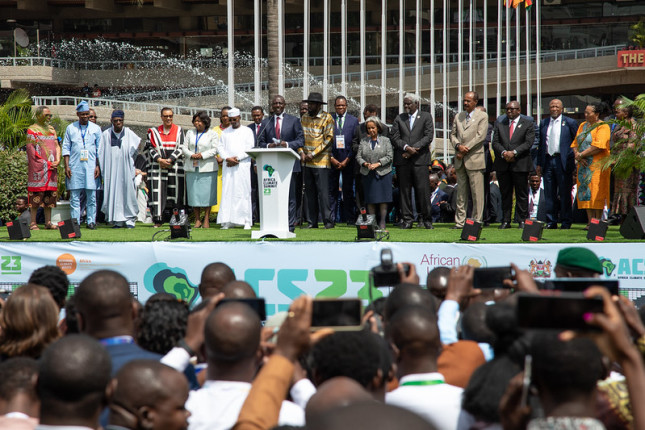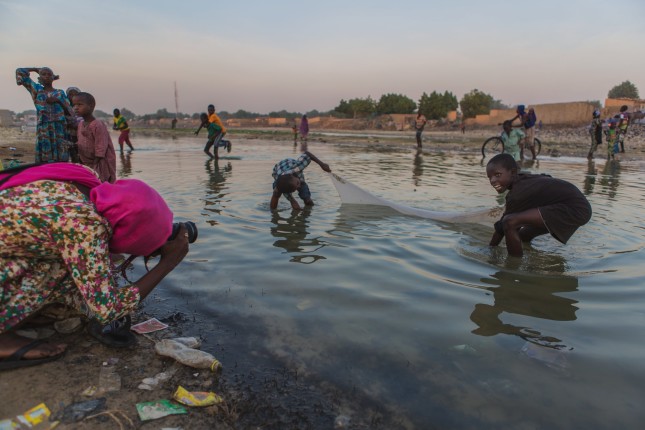-
The Arc | Inclusive Green Energy: Accelerating Just Transitions
› In today’s episode of The Arc, we are featuring a panel discussion on how to accelerate just energy transitions around the globe from the Forum on Advancing Inclusive Climate Action in Foreign Policy and Development, hosted by the Wilson Center in collaboration with the White House and USAID’s Bureau for Humanitarian Assistance, with support from the USAID Climate Adaptation Support Activity.
In today’s episode of The Arc, we are featuring a panel discussion on how to accelerate just energy transitions around the globe from the Forum on Advancing Inclusive Climate Action in Foreign Policy and Development, hosted by the Wilson Center in collaboration with the White House and USAID’s Bureau for Humanitarian Assistance, with support from the USAID Climate Adaptation Support Activity. -
The Arc | Financing Inclusive Climate Action: Investing in and Empowering Local Communities
› In today’s episode of The Arc, we’re sharing a panel discussion from the Forum on Advancing Inclusive Climate Action in Foreign Policy and Development, an event hosted by the Wilson Center in collaboration with the White House and USAID’s Bureau for Humanitarian Assistance, and with support from the USAID Climate Adaptation Support Activity.
In today’s episode of The Arc, we’re sharing a panel discussion from the Forum on Advancing Inclusive Climate Action in Foreign Policy and Development, an event hosted by the Wilson Center in collaboration with the White House and USAID’s Bureau for Humanitarian Assistance, and with support from the USAID Climate Adaptation Support Activity. -
Children and Slaves are Mining our Critical Metals (and Not Just Cobalt)
›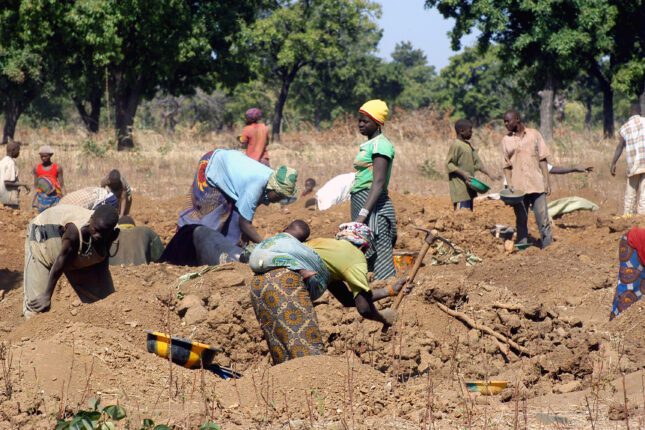
This article is adapted from Vince Beiser’s “Power Metal” newsletter.
If you’ve heard anything about the dark side of the shift to renewable energy and digital tech—one of the main topics of my new book, Power Metal: The Race for the Resources That Will Shape the Future—you’ve probably heard about the children working in cobalt mines in the Democratic Republic of Congo (DRC). That particular outrage has been covered by major international news outlets, human rights organizations and another recent book, Cobalt Red. But it turns out there are many other places where children, as well as enslaved adults, are producing the metals that go into our electric cars and cell phones.
-
Americans Want to Challenge China’s Presence in Africa. They Could Start by Showing Up
›
Zambia’s Copperbelt province is a microcosm of foreign investment on the continent.
Fly into Lusaka and marvel at the capital’s strikingly modern airport. Drive into town along a road as smooth as any American highway. Look left and notice a large white hospital complex. Glance right only a few minutes later to see the city’s impressive conference center with a “Golden Chopsticks” restaurant next door.
-
Indigenous Partnerships Can Bring Progress in LAC Energy Projects
›
Este ensayo se actualizó con una traducción al español, disponible después de la versión en inglés, a continuación.
Latin American and Caribbean (LAC) countries have committed to transitioning to a net zero economy by 2050. Will they be able to do so without leaving anyone behind? It is unlikely, if business models don’t change.
An annual investment of $700 billion will be needed to curb emissions from the energy sector and its end uses, as well as from agriculture, forestry and other land use. In the clean energy sector alone, investment must increase nearly fivefold from its 2022 level.
-
Introducing “The Arc”
›
On today’s episode of New Security Broadcast, ECSP is launching a new series called The Arc, focused on the connections between climate change, equity, justice, and identity. We will cover a wide range of topics – from food and water systems to the energy transition, migration, and climate finance – and talk with practitioners, advocates, professors, and community leaders to discover where these topics intersect with issues related to climate impacts and justice.
-
Africa’s First Climate Summit: From Victim to Leader?
›
The UN Environment Programme has described Africa as the most vulnerable region in the world to climate change. Despite only being responsible for 3% of global emissions, the continent has been battered by extreme weather events, including droughts, cyclones, wildfires, and sandstorms. One in three people across Africa faces water scarcity. The continent’s agricultural sector, which represents a significant share of African countries’ GDP and employment, is highly exposed to climate change.
-
Creating an Environment of Peace Means Avoiding Backdraft
›
The much-needed transition to a zero carbon, green economy offers opportunities to contribute to peace, but only if the conflict risks of transition are understood and managed to produce a just and peaceful transition. That means minimizing “backdraft”—the unintended negative impacts of transition that are a key obstacle to that goal.
Showing posts from category backdraft.


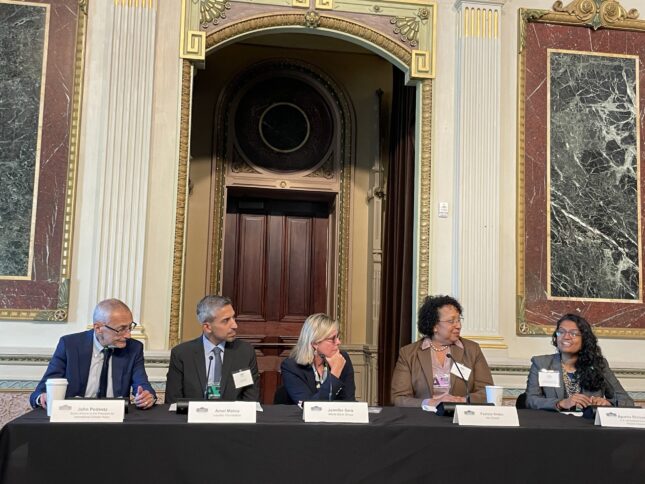 In today’s episode of The Arc, we are featuring a panel discussion on how to accelerate just energy transitions around the globe from the Forum on Advancing Inclusive Climate Action in Foreign Policy and Development, hosted by the Wilson Center in collaboration with the White House and USAID’s Bureau for Humanitarian Assistance, with support from the USAID Climate Adaptation Support Activity.
In today’s episode of The Arc, we are featuring a panel discussion on how to accelerate just energy transitions around the globe from the Forum on Advancing Inclusive Climate Action in Foreign Policy and Development, hosted by the Wilson Center in collaboration with the White House and USAID’s Bureau for Humanitarian Assistance, with support from the USAID Climate Adaptation Support Activity.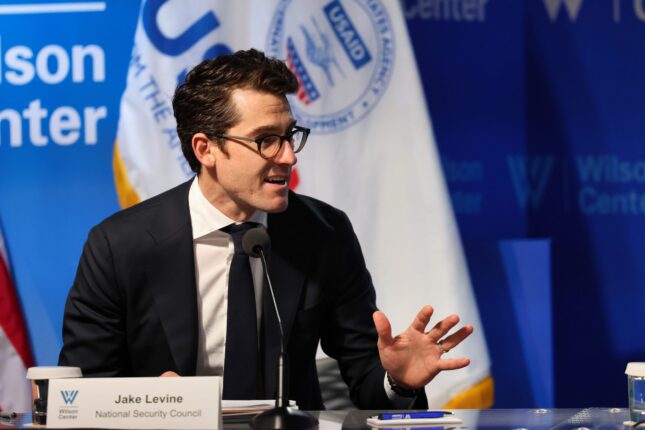 In today’s episode of The Arc, we’re sharing a panel discussion from the Forum on Advancing Inclusive Climate Action in Foreign Policy and Development, an event hosted by the Wilson Center in collaboration with the White House and USAID’s Bureau for Humanitarian Assistance, and with support from the USAID Climate Adaptation Support Activity.
In today’s episode of The Arc, we’re sharing a panel discussion from the Forum on Advancing Inclusive Climate Action in Foreign Policy and Development, an event hosted by the Wilson Center in collaboration with the White House and USAID’s Bureau for Humanitarian Assistance, and with support from the USAID Climate Adaptation Support Activity.
